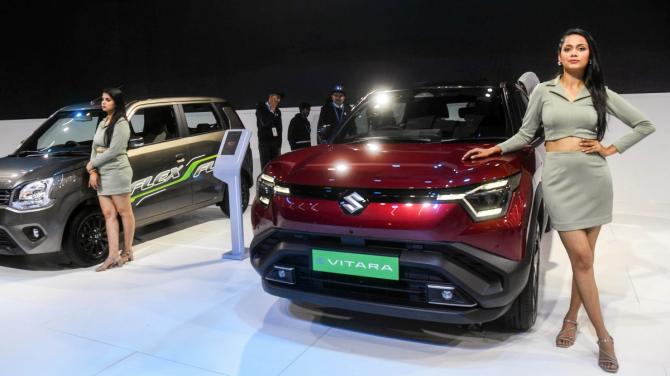Our Terms & Conditions | Our Privacy Policy
Auto: Small Cars Get Big Relief in New Fuel Efficiency Norms
Maruti Suzuki, India’s largest producer of small cars, stands to benefit the most.
Kindly note the image have only been published for representational purposes. Photograph: Amit Sharma/ANI Photo
The Bureau of Energy Efficiency (BEE) on Thursday revised its June 2024 draft fuel efficiency norms, introducing special relief for small cars for the first time and offering incentives for flex-fuel and strong hybrid vehicles.
The revision comes after an intense and bitter debate within the automobile industry.
Maruti Suzuki had requested special relief for small cars under the CAFE-3 and CAFE-4 norms (“CAFE” stands for corporate average fuel efficiency), while other carmakers, including Tata Motors and Mahindra & Mahindra, opposed any such concession.
In June last year, the BEE had issued its first draft CAFE-3 and CAFE-4 norms, which will be implemented between April 2027 and March 2037.
The Society of Indian Automobile Manufacturers (Siam) had suggested changes in December last year.

Photograph: Babu/Reuters
Earlier this year, Maruti Suzuki had put in its relief request, following which the BEE issued its revised draft norms on Thursday.
CAFE norms set the average carbon-dioxide emission, or fuel-efficiency targets that a carmaker’s fleet must meet. They are measured in grams of the gas emitted per kilometre (gm/km) for each vehicle.
In the revised draft, the CAFE norms classified “small cars” separately for the first time.
A petrol car is considered a small car if it weighs up to 909 kg, has an engine of 1,200 cc or less, and is not longer than 4,000 mm — mostly entry-level hatchbacks and compact sedans.
Maruti Suzuki, India’s largest producer of small cars, stands to benefit the most.
These small cars get special treatment. On top of carbon-dioxide savings achieved through certified technologies, they can subtract an extra 3 gm/km from their declared emission.
The new draft stated: “Considering the limited potential for efficiency improvements in petrol vehicle models with an unladen mass up to 909 kg, engine capacity not exceeding 1200 cc and length not exceeding 4000 mm … such cars shall be eligible to claim, in addition to certified technology-based savings, a further reduction of 3.0 g CO₂/km in its manufacturer-declared CO₂ performance for calculation of performance under CAFE 2027.”
This means a small car that saves 2 gm of carbon dioxide per km through technology — for instance, via start-stop systems or better tyres — can count 5 gm of carbon dioxide per km toward its CAFE performance.
However, the new draft also caps the benefit: No small car model “shall be permitted to claim a cumulative reduction exceeding 9 g/km of CO₂ in any reporting period”.
This ensures fairness and prevents exaggerated savings.

Photograph: Kind courtesy, Pixabay
In June last year the BEE had proposed changes that would have made compliance harder for strong hybrids and slightly easier for electric vehicles (EVs).
The volume derogation factor is a multiplier that gives extra weight to certain vehicles in fleet carbon-dioxide calculations, so each EV or hybrid can count as more than one car.
The BEE had in June 2024 suggested increasing the factor for EVs from three to four, while reducing it for strong hybrids from two to 1.2.
In the revised draft issued on Thursday, the BEE has maintained the factor for EVs at three and strong hybrids at two.
This benefits companies like Maruti Suzuki and Toyota, which are among the largest strong hybrid sellers in India, allowing their hybrids to retain full credit under CAFE and remain attractive for compliance.
The draft also introduces a Carbon Neutrality Factor (CNF), a discount on declared emission for vehicles using cleaner fuels or hybrid technology.
Petrol cars running on E20-E30 fuel blends get an 8 per cent reduction, CNG (compressed natural gas) vehicles get 5 per cent (or higher, depending on compressed biogas blending), and flex-fuel ethanol vehicles and strong hybrids capable of running on flex fuel get a 22.3 per cent discount.
In practice, a strong hybrid running on flex fuel that emits 100 gm/km in lab tests would be counted as only 77.7 gm/km for CAFE compliance.
Currently, strong hybrids sold in India by Toyota (the Hyryder, Innova Hycross, Camry) and Maruti Suzuki (Grand Vitara and Invicto) run on regular petrol and do not qualify for the 22.3 per cent CNF but only the 8 per cent petrol discount.
To gain the full CNF, manufacturers would need to introduce flex-fuel strong hybrids, something Toyota has piloted in Brazil and showcased as a prototype in India.
The BEE has given automobile stakeholders 21 days to send their response to new draft CAFE norms.
Business Standard requested all major carmakers — Maruti Suzuki, Hyundai, Tata Motors, Toyota, Mahindra & Mahindra, Kia, Skoda, and JSW MG Motors — to send their statements on the new draft norms. There was no response from any.
Fresh draft rules
- For strong hybrid cars, full volume derogation factor of 2 retained
- Carbon Neutrality Factor introduced for cleaner fuels, hybrids
- Flex-fuel, strong hybrid cars get 22.3 per cent lower CO2 under CNF
- Stakeholders to submit feedback on revised draft norms in 21 days
Feature Presentation: Rajesh Alva/Rediff
Images are for reference only.Images and contents gathered automatic from google or 3rd party sources.All rights on the images and contents are with their legal original owners.



Comments are closed.